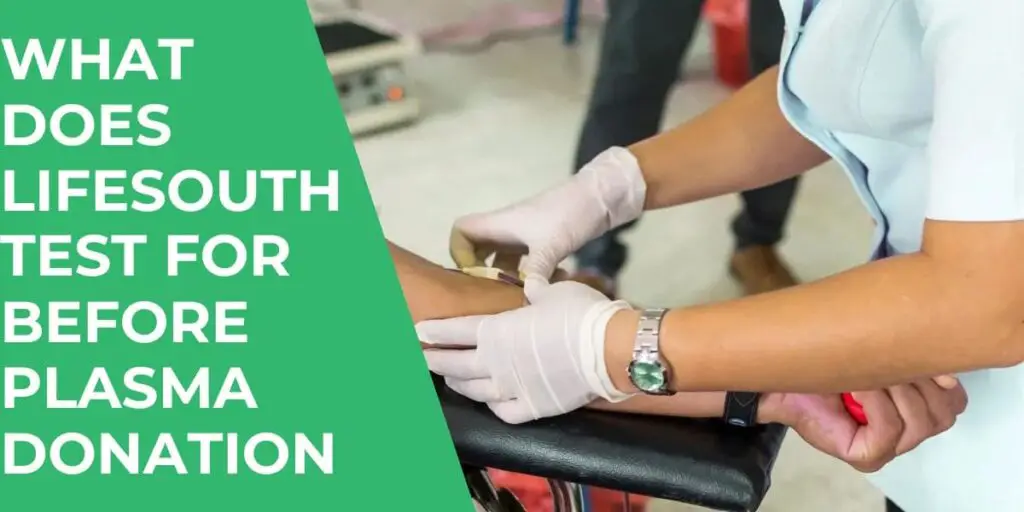
As I found myself stretched out on a clinical, yet oddly comfy, recliner chair, needle in the arm, the thought crossed my mind – does the American Red Cross pay for plasma donations?
We often donate out of goodwill, but I couldn’t help but wonder.
So, I did some digging.
Let’s find out: Does Red Cross Pay for Plasma and if so, exactly how much.
Does Red Cross Pay for Plasma?
No, the American Red Cross does not pay for plasma donations. They rely on the generosity of volunteers, fostering a culture of giving to help those in need, rather than offering financial compensation.

For more insight into how different donation organizations operate, you’ll find our LifeSouth vs Red Cross comparison informative.
Explanation of the American Red Cross Plasma Donation Policy
The American Red Cross Plasma Donation policy is rooted in the principles of volunteerism and altruism. They believe that blood and plasma donations should be given freely out of a desire to help others.
The policy does not provide financial compensation to donors, aiming to ensure that the quality and safety of the donations are not compromised.
The Red Cross also offers health screenings for donors, checks for infectious diseases in every donated unit, and maintains detailed records to assure the safety of both the donor and the recipient.
They operate on stringent guidelines that include donor eligibility, the donation process, and post-donation care.
This policy allows the Red Cross to foster a community-oriented and altruistic culture among its donors, one where the focus remains on the shared goal of saving lives and improving health, rather than on monetary gains.
Check this post on First Time Plasma Donor Bonus to see which company offers their New donor the highest bonus.
Comparison of American Red Cross Plasma Donation with Other Organizations
| Organization | Offers Payment? | Locations | Donor Perks |
|---|---|---|---|
| American Red Cross | No | Nationwide (U.S) and International | Recognition items, Health screening |
| LifeSouth | No | Southeast U.S | Health screening, Community impact |
| BioLife | Yes | Nationwide (U.S) | Monetary compensation, Biolife debit card |
| CSL Plasma | Yes | Nationwide (U.S) and International | Monetary compensation, CSL Plasma prepaid card |
Check out this post to know what is the CSL New Donor Pay.
Why Doesn’t the Red Cross Pay for Plasma Donations?
These are the reasons the Red Cross doesn’t pay for plasma donations:
- Volunteerism Ethic: The Red Cross was founded on the principles of volunteerism and altruism. They believe that people should donate plasma and blood products out of a desire to help others, not for monetary compensation.
- Safety Concerns: Some studies suggest that unpaid donations might be safer. Paid donors might be tempted to withhold information about their health that could impact the quality of the plasma.
- Non-profit Status: As a non-profit organization, the Red Cross may not have the financial capacity to pay donors consistently. Instead, resources are directed toward collecting, processing, and distributing the donations.
- Donor Relationship: The Red Cross aims to build a relationship with donors based on the shared goal of saving lives, rather than a transactional relationship.
- Regulation: In some regions, regulatory guidelines may also influence the decision not to provide financial incentives for donations.
How to Donate Plasma at Red Cross
Follow these steps to donate plasma at the Red Cross:
- Determine Eligibility: Check the Red Cross’s eligibility requirements for plasma donation. You must be at least 17 years old (16 with parental consent in some states), weigh at least 110 pounds, and be in good health.
- Schedule an Appointment: You can schedule an appointment online via the Red Cross website, by calling their hotline, or by using their mobile app. You can choose a location and time that works best for you.
- Prepare for Donation: On the day before your donation, make sure to hydrate well and eat a low-fat, healthy meal. Also, bring a valid ID and a list of any medications you’re currently taking to your appointment.
- Undergo Health History and Mini Physical: At the donation center, you will answer some questions about your health history and undergo a mini-physical, which includes checking your temperature, blood pressure, pulse, and hemoglobin level.
- Donation: If you are eligible, a staff member will guide you through the plasma donation process. The procedure involves drawing blood, separating the plasma, and returning the remaining components back to you. It typically takes about 1.5-2 hours.
- Rest and Rehydrate: After donating, spend a few minutes in the recovery area where you can have a snack and drink to replenish your fluids.
- Schedule Your Next Donation: You can donate plasma every 28 days, up to 13 times a year. Consider scheduling your next donation before you leave. Check this post to know if it is safe to donate plasma twice a week.
What Does Red Cross Test for Before Plasma Donation?

Some of the tests that Red Cross will perform include:
- Checking blood pressure, pulse, and temperature. Also, the health worker will check your hemoglobin level to ensure you are healthy enough to donate.
- Testing your plasma for infectious diseases like HIV, hepatitis B and C, and syphilis.
- Screening for other health conditions, such as anemia, could impact your eligibility to donate.
Red Cross Plasma Donation Requirements
These are the Red Cross Plasma Donation Requirements:
- Age: Donors must be at least 17 years old (16 in some states with parental consent).
- Weight: Donors should weigh at least 110 pounds.
- Health: Donors must be in good general health and feeling well at the time of donation.
- Travel: If you have recently traveled to certain regions, it might affect your ability to donate.
- Medications: Some medications may impact your eligibility to donate.
- Medical Conditions: Certain medical conditions can disqualify a potential donor, such as recent infections or chronic diseases.
- Previous Donations: Plasma can be donated every 28 days, up to 13 times a year.
What Are the Benefits of Donating Plasma To the Red Cross?
These are the Benefits of Donating Plasma to the Red Cross:
- Life-saving potential: Plasma is critical to many medical treatments, and your donation can help save lives.
- Compensation: Donors will receive compensation for their donations, which can provide some extra income.
- Personal satisfaction: Donating plasma can provide personal satisfaction, knowing that you are making a difference in your community and helping others in need.
- Safe and comfortable environment: LifeSouth provides donors with a safe and clean environment for donation. Also, they have highly trained staff to ensure the donation process is comfortable.
- Free health screenings: LifeSouth offers free health screenings to donors. These screenings can help identify potential health risks or conditions needing further medical attention.
FAQs on Does Red Cross Pay for Plasma
These are the most frequently asked questions on Does Red Cross Pay for Plasma:
How does the Red Cross encourage plasma donation if they don’t offer financial compensation?
The Red Cross motivates plasma donations through altruistic appeal, sharing success stories, providing recognition items, conducting health screenings, and creating a sense of community and shared responsibility in saving lives.
Conclusion
In conclusion, while the question “Does Red Cross pay for plasma?” may intrigue many, the answer is a definitive no. The Red Cross relies on the goodwill and generosity of its donors to meet the constant need for plasma. They foster a culture of giving, underlining that the real payment is the potential life saved or improved through each donation. So, let’s roll up our sleeves and donate because the value of helping others is truly priceless.
